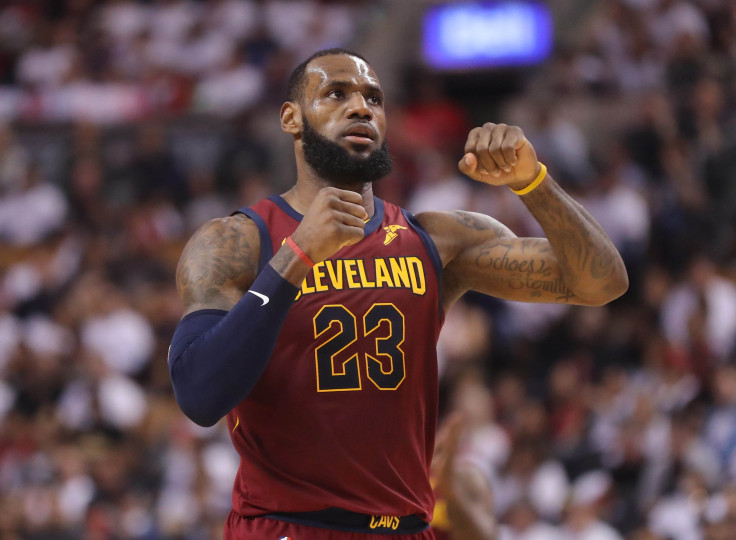How LeBron James Made NBA Playoff History, Crushed The Raptors' Spirit

LeBron James’ performance Thursday night against the Toronto Raptors was one for the ages. Even though impressive stat lines, triple-doubles and 40-point games have become commonplace for the Cleveland Cavaliers’ star, no one could’ve expected what he would do in Game 2 of the second-round series.
The NBA’s best player had 43 points, eight rebounds and 14 assists in a 128-110 victory in Toronto. He made 19 of 28 field-goal attempts and turned the ball over just once. It became the first-ever 40-point, 14-assist performance in playoff history.
James set a career-high by scoring or assisting on 77 of Cleveland’s points. He tied Oscar Robertson’s playoff record of leading his team in points and assists in 10 straight playoff games and set the record for most 40-point, 10-assist playoff games. In nine games, James has his 2018 postseason numbers up to 34.4 points, 9.9 rebounds and 9.0 assists per game on 54.8 percent shooting.
The 33-year-old did all of this less than 48 hours after playing 47 minutes in a grueling overtime victory. That Game 1 win was just two days after James played 43 minutes in Game 7 of the first round. James has played five games in nine days, averaging nearly 41 minutes per contest.
All of the minutes had clearly been wearing on James. He experienced cramps in the series finale against the Indiana Pacers, and he shot 12-30 from the field in Game 1 against Toronto. This came after James played all 82 regular-season games in his 15th NBA season.
How did he manage to play at such a high level in Game 2 against the East’s No.1 seed?
James spent all of Wednesday’s day off preparing his body for Thursday's Game 2. That included cupping, according to ESPN’s Brian Windhorst, a technique James hadn't tried in years. He was asleep by 10 p.m. EDT and got nine hours of rest before taking the court again.
James also knew how the Raptors would attack him. He shot poorly in Game 1 and missed seven of his eight three-point attempts. Toronto would do their best to keep him out of the paint and force him to take jump shots.
“I pretty much know the scouting report on me is going to be to dare me to shoot jump shots and keep me out of the paint, not allow me to go to the free throw line,” James said in the Game 2 post-game press conference. “Over the course of my career, I just try to put a lot of work into other facets of my game to try to neutralize their game plan.”
A master at managing his minutes, James bided his time. He fed Kevin Love early to get Cleveland’s second-leading scorer going. After a miserable start to the postseason, Love took nine first-quarter field goals and finished the night with 31 points.
But James’ quiet start didn’t last long. He started to get to the rim in the second quarter and made a long pull-up jumper just inside the three-point line to cut Toronto’s lead to 63-61 heading into halftime. James knew his shot was falling, and he knew the Raptors were in trouble.
The end result was a shooting display unlike anything the league has seen, at least in recent memory. In addition to getting easy shots at point-blank range and finding open teammates, James made a string of contested fadeaways. Seven turnaround jump shots—each more difficult than the next—made their way through the net, demoralizing the once-favored Raptors.
In the span of fewer than 20 minutes of game time, Toronto saw their nine-point lead turn into an 18-point deficit. There was nothing the Raptors could do to stop James, who made 17 of 26 contested shots.
That’s certainly one way to defeat the league’s fifth-best defensive team. It was a game plan only James could pull off because of the degree of difficulty of those shots, but it was a calculated one, executed after watching film from the series opener and seeing how the Raptors tried to stop him.
Love told reporters in the Game 2 press conference that he knew James would have a big night and saw his teammate practice those same fadeaways during shootaround.
“I gave [teammates] a little inside of my mind,” James told reporters with a smile. “And I showed 'em tonight as well.”
ICYMI: LeBron's fadeaway couldn't be stopped in Game 2. pic.twitter.com/YUpCK5CEPa
— SportsCenter (@SportsCenter) May 4, 2018
Scoring at will, James did what he’s done to Toronto in each of the last three postseasons. He crushed their spirit, taking the first two games of the series on the road, as well as any realistic chance the Raptors might've had of finally defeating the Cavaliers.
Kyle Lowry scored 10 first-quarter points, looking to end the narrative that Toronto’s star backcourt crumbled when faced with adversity against Cleveland. As James and the Cavs took over in the third quarter, the point guard attempted just one shot.
DeMar DeRozan went two-of-six in the third quarter. He scored nine of his 24 points after Cleveland took an 18-point fourth-quarter lead and the game was out of reach.
The Cavs are two wins away from defeating the Raptors in the playoffs for a third straight year. That feels like a formality as the series shifts to Cleveland. Toronto is 1-28 on the road against James in their last 29 games.
This was supposed to be the year in which James might actually not win the Eastern Conference. After making seven straight appearances in the NBA Finals, the four-time champion has less help than he’s ever had during that span.
But if James somehow keeps getting better, there’s nothing Toronto, Boston or Philadelphia can do to stop him.
© Copyright IBTimes 2025. All rights reserved.






















